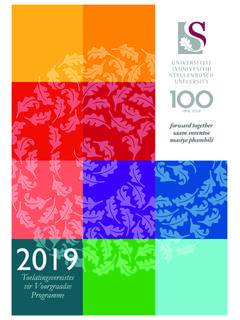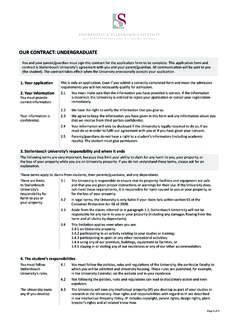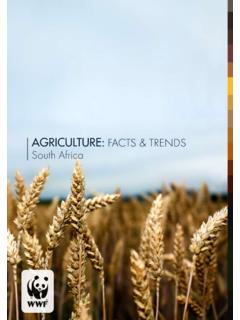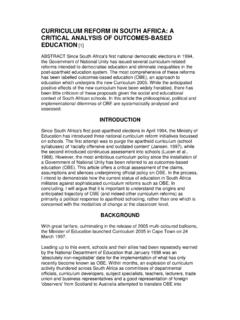Transcription of (,1 2 1/,1(
1 +(,121/,1(. Citation: 17 Stellenbosch L. Rev. 351 2006. Provided by: Available Through: Stellenbosch University Content downloaded/printed from HeinOnline Fri Mar 3 06:59:00 2017. -- Your use of this HeinOnline PDF indicates your acceptance of HeinOnline's Terms and Conditions of the license agreement available at -- The search text of this PDF is generated from uncorrected OCR text. -- To obtain permission to use this article beyond the scope of your HeinOnline license, please use: Copyright Information TRANSFORMATIVE CONSTITUTIONALISM*.))
2 Justice Pius Langa Chief Justice of the Republic of south africa . 1 Introduction Both the Constitutional Court1 and other courts 2 view the Constitu- tion as transformative. The previous Chief Justice has written that a "commitment ..to transform our society ..lies at the heart of the new constitutional order". 3 It is clear that the notion of transformation has played and will play a vital role in interpreting the Constitution. The main purpose of this address is to determine what barriers exist to the achievement of that transformation.
3 2 What is transformative constitutionalism? Before I attempt to analyse the problems that transformative constitutionalism faces in south africa , it is necessary to say what I. understand the concept to mean. Unfortunately, there is no single accepted definition. The current Deputy Chief Justice 4 has said in this regard: "the meaning of transformation in juridicial terms is as highly contested as it is difficult to formulate". It is perhaps in keeping with the spirit of transformation that there is no single stable understanding of transformative constitutionalism.
4 * Prestige lecture delivered at Stellenbosch University on 9 October 2006. See, eg, S v Makwanyane 1995 3 SA 391 (CC), 1995 6 BCLR 665 (CC) par 262: "What the Constitution expressly aspires todo is to provide a transition from these grossly unacceptable features of the past to a conspicuously contrasting .. future."; Du Plessis v De Klerk 1996 3 SA 850 (CC), 1996 5 BCLR 658. (CC) par 157: "[The Constitution] is a document that seeks to transform the status quo ante into a new order". 2 See, eg, Rates Action Group v City of Cape Town 2004 12 BCLR 1328 (C) par 100: "Ours is a transformative constitution.
5 Justice Scalia of the US Supreme Court has said that "the whole purpose of a constitution, old or new .. is to impede change or pejoratively put 'to obstruct modernity'.. Whatever the position may be in the USA or other countries, that is not the purpose of our Constitution. Our Constitution provides a mandate, a framework and to some extent a blueprint for the transformation of our society from its racist and unequal past to a society in which all can live with dignity." (references omitted) (per Budlender AJ); City of Johannesburg v Rand Properties (Pty) Ltd 2006 6 BCLR 728 (W) pars 51-52: "Our Constitution encompasses a transformative provision.
6 As such, the State cannot be a passive bystander in shaping the society in which individuals can fully enjoy their rights? [The full transformative power of the rights in the Bill of Rights will only be realised when they are interpreted with reference to the specific social and economic context prevalent in the country as a whole, and the social and economic context within which the applicant now finds itself in particular.". (per Jajbhay J). 3 Soobramoney v Ministerof Health, KwaZulu-Natal 1998 1 SA 765 (CC), 1997 12 BCLR 1696 (CC) par 8.]
7 4 Moseneke "The Fourth Brain Fischer Memorial Lecture: Transformative Adjudication" 2002 18. SAJHR 309 315. STELL LR 2006 3. There must, however, be agreement at any rate on some basis for an understanding of transformative constitutionalism. I would suggest that the Epilogue, also known as the Postamble, to the interim Constitution provides that basis. The Epilogue describes the Constitution as providing: "a historic bridge between the past of a deeply divided society characterised by strife, conflict, untold suffering and injustice, and a future founded on the recognition of human rights, democracy and peaceful co-existence and development 5 opportunities for all south Africans, irrespective of colour, race, class, belief or sex".
8 This is a magnificent goal for a Constitution: to heal the wounds of the past and guide us to a better future. For me, this is the core idea of transformative constitutionalism: that we must change. But how must we change? How does the society on the other side of the bridge differ from where we stand today? First, the new society is one based on substantive equality. Writing in the south African Journalof Human Rights in 1998, Albertyn & Goldblatt make the point that the movement from the one side of this bridge to the other will "require a complete reconstruction of the state and society, including a redistribution of power and resources along egalitarian lines.
9 The challenge of achieving equality within this transformation project involves the eradication of systemic forms of domination and material disadvantage based on race, gender, class and other grounds of inequality. It also entails the development of opportunities6' which allow people to realise their full human potential within positive social relationships.". Transformation then is a social and an economic revolution. south africa at present has to contend with unequal and insufficient access to housing, food, water, healthcare and electricity.
10 As former Chief Justice7. Chaskalson wrote in Soobramoney v Minister of Health, KwaZulu-Natal, "[flor as long as these conditions continue to exist that aspiration [that is, of substantive equality] will have a hollow ring". The provision of services to all and the levelling of the economic playing fields that were so drastically skewed by the apartheid system must be absolutely central to any concept of transformative constitutionalism. 8 Transformation in this sense does not only involve the fulfilment of socio-economic rights, but also the provision of greater access to education and opportunities 9.]















